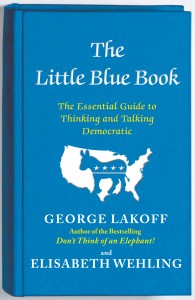For an ongoing discussion of the way language matters, check out The Little Blue Blog, a compilation of brief analyses of how issues about public policy are framed, especially as undergirded by particular conceptions of democracy. Bloggers George Lakoff and Elisabeth Wehling describe the blog:
The Little Blue Blog is a continuation of The Little Blue Book: The Essential Guide to Thinking and Talking Democratic. The book addressed a problem that progressives face everywhere: conservatives have framed just about every issue in conservative moral terms. Progressives all too often find themselves stuck with using conservative language and ideas, which reinforces those ideas even in arguing against them. The Little Blue Book tells how to get out of the trap. Use the progressive moral system you believe in. This is about much more than words. Words mean things. You need to say what you believe and what is true. Progressive communication is democratic communication. It requires that you be transparent, authentic, honest, and strong if your fellow citizens are to trust you. This is advice for all citizens, not just our leaders.
In a description called ‘framing the issues’ Lakoff & Wehling give a short lesson in frames… the ways in which ideas are clumped together so that things make sense to us. In particular, “Frames are structured in a hierarchy. To understand a kitchen, you have to understand food preparation and eating. In politics, the highest frames are moral frames. The reason is that all politics is moral: political leaders propose policies because they are right — not because they are wrong or don’t matter. All policies, therefore, have a moral basis.” As such, ‘facts’ and ‘logic’ have significantly less purchase then we think in determining what and how we believe and think.
 This blog is a continuation of The Little Blue Book, and both are meant to school Democrats and progressives on how to use language and frames more effectively within public discourse about policy issues. Lakoff & Wehling follow their own advice in this discourse by making their own moral frames the basis for their discussion.
This blog is a continuation of The Little Blue Book, and both are meant to school Democrats and progressives on how to use language and frames more effectively within public discourse about policy issues. Lakoff & Wehling follow their own advice in this discourse by making their own moral frames the basis for their discussion.
 Follow
Follow
